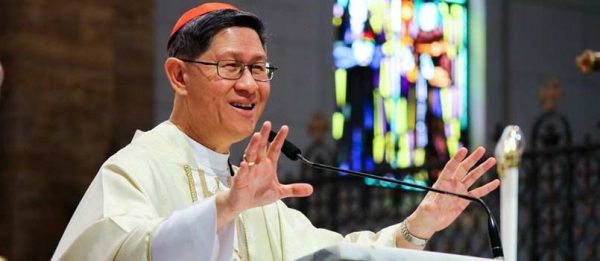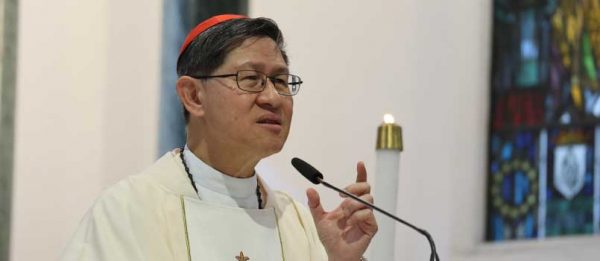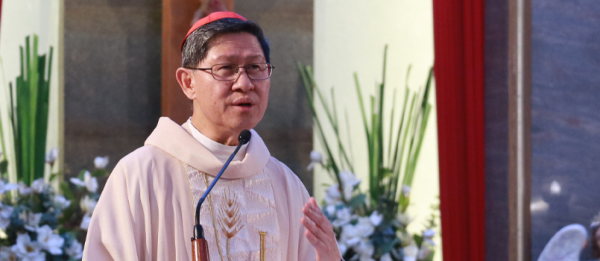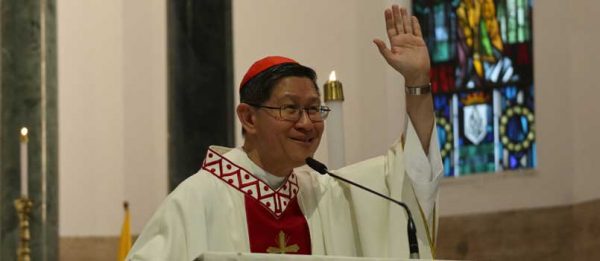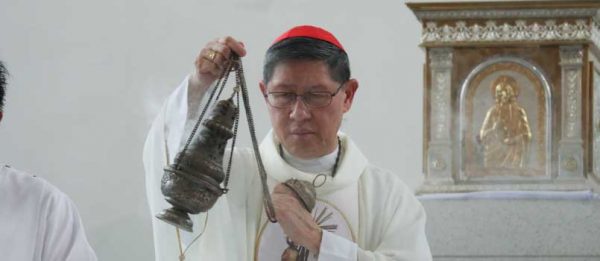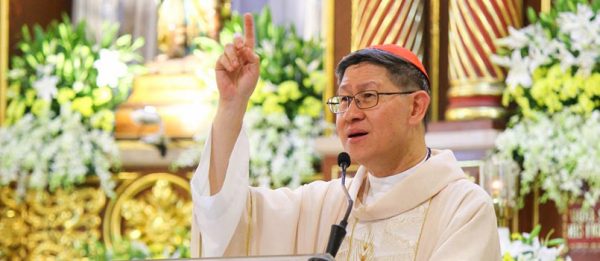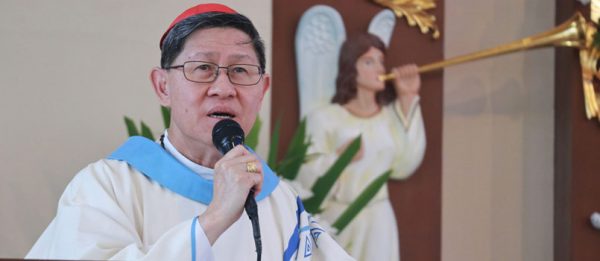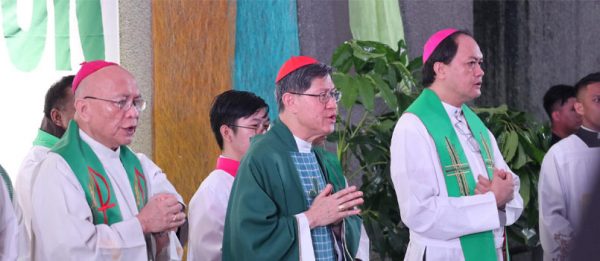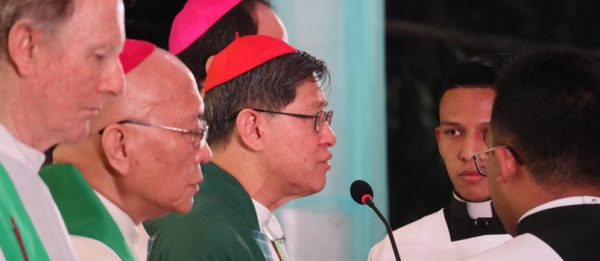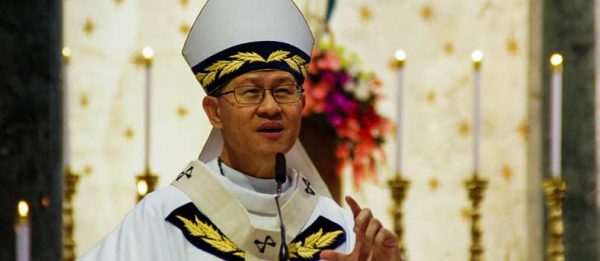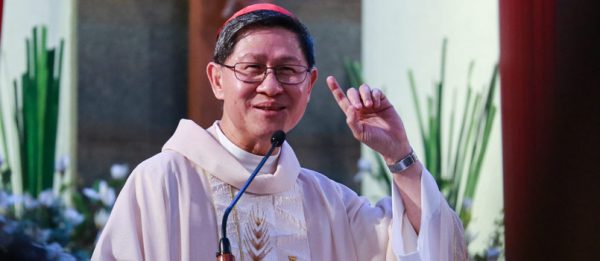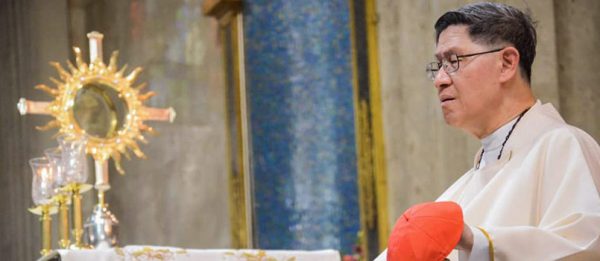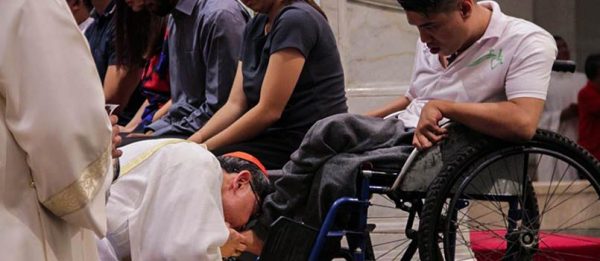274 total views
Homily
Manila Archbishop Luis Antonio Cardinal Tagle
Clergy Recollection of the Archdiocese of Manila
San Carlos Lay Formation Center
June 19,2018
To pray is to wish and to will the good for those who are wishing me evil. And this does not depend in whether we like it or not, or whether we feel doing it or not for Jesus it is my word, I tell you and also, this is how you will show that you are children of the Father, for the Father loves everyone, the Father has a heart.
God has a heart that has enough space for those whom he calls children and that includes those that call each other enemies. This is a good reminder for all of us specially at a time when there seems to be a lot of negativity, a lot of harshness, a lot of persecution and a lot of labeling and we might even fall into the trap of labeling people. This is a neighbor, this is a collaborator, this is a friend, this is an enemy, not literally naman noh… and it can happen even within the church, even church organizations, we determine who is a neighbor, who is a competitor, who is an enemy, and people, who might not think the way I do is automatically labeled an enemy.
Someone who does things differently from my ways is an enemy, and if that label persists, what do we do with enemies? We hate, we persecute, and if happens within the church, then the church’s witness is very much weakened, so it is there within this family of God’s children, that we are reminded over and over again, what type of labeling do we have in our minds? And part of this universal love is to do what Elijah did in the first reading to Naboth, declaring the unjust deeds of Naboth, but also inviting to conversion, and the unexpected happened, he repented and God recoiled from God’s own justice and did not inflict the punishment on him.
The mercy the love prevailed. A good reminder to all of us I know that we are also tempted to label. When I was a pastor, when the secretary tells me, Mr. so and so wants to see you in the office, naku my mind already labels people, ahhh this person is a friend, o sige, serve him coffee I will be there… ahhh, Ms. So and so wants to see you, ahhh, an enemy, tell her, I am busy, always labeling, that can happen, and then the flow of love, the flow of love that we should be channels of as children of God, suddenly gets hindered, but let it not be just romanticism.
When Jesus talks about loving your enemies, praying for those who persecute you they can always turn to Saint Paul the first letter to the Corinthians Chapter 13, love, love is kind, love is patient, love is never rude, it is always respectful, love is not boastful, love just not put on airs, love does not wish evil, love bares all things, because love trusts with an eternal spring, love does not end, everything else will disappear but love remains. It is humbling to be reminded of this and Saint Paul the letter to the Romans would even say, “We will never conquer evil with evil, evil will only be conquered by good, and he greatest of goods is love, sincere love.
The Church rests on this, Pope Benedict, in his Caritas Est says that, “the Church, as Church rest on three pillars, the word of God, the Sacraments and the service of Charity, we have different labels, we may call it Social Action, we may call it paralegal assistance, we may call it human rights promotion, we may call it feeding the children, we may call it free clinics. We have different types of ministries but in the end they should be a type of service, motivated and pursued by love.
Without that love put into action in forms of services and institutions, then as Pope Francis would say it is the church, it is NGO, it is Social Service that’s why even for the Caritas National Confederation, one of the strategic goals now is the formation of Caritas Volunteers and workers, formation of the heart, formation in love, formation in the Catholic Social teachings, so that the love of God is the one that is manifested, and I tell you, twice I was able to visit Lebanon when Archbishop Caccia was still the Nuncio there, I remember in one camp, the Nuncio was not with us, then in one camp that was almost totally Muslim one of the leaders there asked me, “why do you Christians think of us? Why are you good to us, why do you feed us? We are not Christians,” and the space was open for testimony.
I said, “That is our God, incarnate in Jesus, telling us to love everyone”, and the Gospel adds, your love is true if you love enemies, those who plan, plot, and execute evil against you. That’s the gospel of today, this is not my plan, so that is a good, good reminder to all of us.
The second point, you know, Pope Francis has been focusing on the Youth. This year, in fact in September, there will be a synod of Bishops on the Youth the transmission of faith and also vocational discernment. Of course, the eventual goal is vocation to priesthood and the consecrated life, but the word vocation, it is taken in its wider sense of finding how the church could help the youth of today find their purpose in life, direction in life.
And part of the Popes concern for the youth is not just the synod, he ask his Jesuit, so he asked the society of Jesus to organize a Jubilee Year of St. Aloysius Gonzaga, San Luis Gonzaga, whose feast is on Thursday. Nakakatakot, why was I maned after him? And this marks this whole ear starting March 9, 2018 up to March 9, 2019, is a Jubilee Year of St. Aloysius. He was born 450 years ago, March 9. So the Holy Year, the center is of course the church of St. Ignatius in Rome, where he is marries, but all other churches, schools and institutions with the name Luis, parang wala tayo masyado, do we have?
But I don’t think that St. Louie Gonzaga, it must be the King. St. Aloysius Gonzaga, died at the age of 23 as a Jesuit seminarian, he came from a noble family that he left everything. His family was very worldly, but he was able to maintain as a young person, thanks to his mother, the strength of character spirituality and he left everything, a career, not only in the military but also in the noble classes open for them, and he joined this society which was still in its beginnings and he died when there was a plague in Rome. He took care of the victims of the plague and he contracted it, and he died.
He was not ordained, and he was declared the Patron of Youth, and the Holy Father thought of declaring this whole year, Jubilee of St. Aloysius, precisely for the Youth, and in Him we find the resolve to find ones meaning in life, not in possessions, in riches, in titles, but in following Christ, we find in him an invitation to young people, to serve others, and he was also declared the patron of HIV-AIDS patients, because he died serving victims of a plague.
Even as a young boy, I was quite afraid, why was he my Patron Saint? A difficult act to follow, but then it is an invitation to always be youthful, he’s the Patron of Youth, but also to serve. That’s why as a graduate student in Washington, I volunteered to take care of HIV-AIDS patients. I spent my last year in Washington, while finishing my dissertation going to HIV-AIDS shelters. I’m just praying that, “Oh my Lord, I emulate St. Aloysius but I hope I would not be contaminated,” maybe my love is not yet complete. But, what an experience? That’s why I was so glad when we had the Year of Mercy to open a Door of Mercy in San Lazaro Hospital in the HIV-AIDS ward.
The youth, the most vulnerable, but also the barometer of where society is. The Holy Father is asking us to listen to the young, again, not with labels, as though the young are always to be blamed, “Oh the young people is like this, the young people is like that,” well they could give us avenues for new approaches, new expressions, in evangelization. Listening to the youth prepares us to listen to the vulnerable, and the context of the youth right now is complicated. My generation, we used to live in very simple context.
When I look back, my life as a young person revolved on very simple poles, the family, the parish, the school, the plaza, just like that. When you are told to buy tooth paste, you went to only one store, and toothpaste meant colgate. And when your parents told you buy toothpaste, that means, colgate. Contexts were very simple, at the age of 15 you know where you want to be.
Now, contexts are shifting, yesterday, we had here the opening of the Academic Year, and we had an academic talk on Human Formation and they asked me to give a talk on fatherhood and from the perspective of the youth, and I asked the seminarians, “Who among you have parents, not in the country?” and I was surprise really, at the number of hands raised. They get money but they lack presence. They set the bar of what is fashionable, and they are easy prey for capitalist advertisements. Part of their vulnerability their desire to belong is manipulated by media, by commerce, they are really vulnerable.
I must have told you already the story, where I was in a youth camp and after my talk, and the talk was about, “Finding One’s Purpose in Life”, after my talk the first question I got from a young girl was will you sing for us? I said, “Hey nobody told me to prepare a song or what, ask sensible questions.” So, sensible questions followed.
Then afterwards, one boy said, “so Bishop, will you sing for us?” I said, “okay I will start a song that everyone knows and we sing together,” and afterwards, you know, you must have experienced this many times, they come to you for a blessing, for a selfie for autograph, some ask for autographs on their bibles, some on their T-Shirts, one girl even said, “here, here Bishop, sign here!” I said, “No! No! No! Turn around!” People might ask, “How did the signature of the Bishop land on the front of her T-shirt?” You know how sensitive times are, but while this was going on, I was wondering, “What is their perception of me? What do they think of me? Am I a Bishop? Am I a celebrity? Am I an actor? Am I a singer? What am I?” and I already was some sort of a self-doubt and I am starting to entertain that. But I just said, “Okay I will listen,” the answer came a year later, in a similar youth camp.
One boy approached me and said, “Bishop you signed, you autographed my shirt last year,” I said, “ah yes, yes, I remember that,” and said, “I have not washed the T-shirt,” and I said “Oh? One year?” and he said, “Every night, I fold it, I put it under my pillow, I have not seen my father, in years, but with that T-shirt, I know I belong to a family.” I thought they were just having fun, I thought it was just following a trend, everyone was doing it, selfie, autograph, but it was more complicated than that. And so we can just pause and ask them, and let us be confused once in a while, in the complexity and the mess of human life. And let us allow ourselves in that humble confusion to be taught by the young people, by the poor by the migrants.
It is easy, as the Pope Francis said, it is easy to repeat principles, but people are in a messy situation, and the clear principles are also messy for them. And so, the humility in love, to be close to them to engage them, to let the poor speak, to let our lay people express the real situation, so that we can understand, and then be humble to admit that we have a lot to learn from them, before we can even craft a program, we might be proposing medicines that they really do not need. So with the youth, the year of the youth, I hope it will lead us to a real pastoral innovation in approach of listening, being close to the vulnerable beginning with the youth, and the other vulnerable people, listening, learning from them, providing a home, actions of love.
Last April, I had a private audience with the Holy Father and he said, enough of words, enough, more actions of love. Last week in Brazil, Cardinal Da Rocha of Brasilia, challenged the Caritas gatherings there, he said, “Oh, we Brazilians, we open our hearts, we open our minds so easily, but we close our Parishes, we close our homes, when it comes to concrete actions, we are lacking,” so let us go to the youth and those in the parishes you might want to name some room, some program, after San Luis, and you might enjoy some indulgence or what, we will see.
Finally, last Sunday, the Global Week of Action of Share the Journey with Migrants and Displaced people started. Last year, Pope Francis inaugurated the international campaign of Caritas, love again, focus on a humane treatment of displaced people, and it is called Share the Journey. We have a right to migrate and really choose where we want to live, but many people now migrate not out of choice, they are forced by some situations, poverty, conflicts, war, hunger, famine, to move out. The Patriarch of the Chaldean in Baghdad who will become a Cardinal, Patriarch Louis Sako, he will become a Cardinal this June 28th-29th.
He asked me, he said, “There are many Filipinos in Iraq, is it part of the Filipino dream to migrate to Iraq?” I really did not know how to answer, I have to be polite, I told him, “Ah, I have not been to your country Patriarch, I said, I’m sure your country is also beautiful, but I have to tell you, I don’t think it is the dream of Filipinos to go to Iraq.” The Filipino dream of migration is to go to the US, Canada, Australia, but, oh, let us go to Iraq, last year I invited some of you, “who would want to with me to Iraq?” There was no volunteer. Even for tourism, more so in migration, who would want to? And then, Syria, the Bishop of Aleppo, Bishop Antoine Audo, a Jesuit, he said “there are Filipinos there, why do they go to a place like that where there are conflicts?” I said, “Are there jobs there?” he said, “Yah, they work in construction, they work in the roads,” he said.
As we speak right now there are 65million people forced to move out. Last week in Brazil, we met some of them from Venezuela, and there’s a small group from Syria, and the girl from Syria said, “I had to escape, I had to escape!” because she witnessed the death of relatives and friends. And slowly one by one she took her family members to Syria, and while learning Portuguese, a new language, learning a new way of life, style of life, she told me, now I am the parent to my parents, and the one taking care of them.
So, share the journey, rest on four verbs used by Pope Francis, to welcome, to protect their dignity, to promote their humanity and rights and to integrate them. That was launched last September, this week we are invited to do little acts of first detecting who are the local and foreign migrants in out places, identify them, encounter them, meet them, welcome them, provide a home, a space, and if they are welcome, and made to feel their human dignity again, they become productive in the host country and they contribute to the growth of the home country, and I guess it is also part of our gratitude, millions of Filipino migrants are in other parts of the world and we thank the countries that have welcome them and we thank people specially churches who have taken care of them.
Father Gratciano is here from Modena and when he invited me there to celebrate mass, I was really edified the way the church the parish, his parish had made the migrants at the center of the parish community and how they cried when Father Gratciano left, but they’re happy that he’s here. I think most of them will come back here because he is here in Manila. And so this is this week also, can we exercise this active love to strangers and Filipinos internally displaced by the Marawi crisis, by the Zamboanga siege, by the typhoons and the earthquakes, the environmental crisis.
And in the end we cannot be proud for all of us are just travelers to, we’re all just passing by, we’re passing through. No one can claim to be an owner or a true host, we are all migrants, we are all on the move and we should share each other’s journey. So love as the Father loves the youth and vulnerable people, engaging them, listening to them, learning from them, learning their contexts, and third, being a welcoming home to the displaced. The church could be a home, a family.
And after the break, we will have some sharing, very interesting from Prof. Richard Cruz of A.I.M., on Innovative Approaches, so that part of New Evangelization, is also what Pope John Paul II says, new expressions, new methods and new fervor so we could learn from them, then we could also have some sharing on Share the Journey, so they could share their stories. Last Holy Thursday, I washed the feet of a Pakistani couple, husband and wife. They escaped from Pakistan, persecuted Christians, what a story to tell. So our day will be focused on love and people who count on us as children of God.





